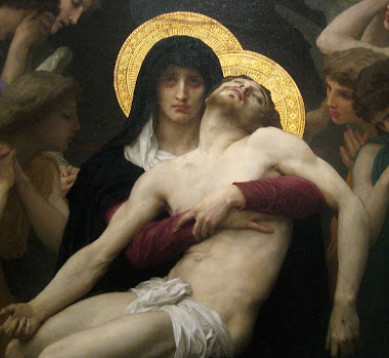Almost one year ago, Pope Francis presided at a special prayer service and gave his Urbi et Orbi blessing - with the faithful participating online from the safety of their homes. St. Peter's Basilica was empty, yet millions of people - Catholic and non-Catholic alike - viewed the hour-long service of prayer and worship, livestreamed via their computers, phones or tablets. A few days later, we watched as he presided over the Holy Week and Triduum services and listened as he proclaimed that the Coronavirus outbreak would be an opportunity for humanity to re-prioritize and to collectively choose that which really matters.
 This was a prayerful message of hope - and it was Francis' response to the suffering of so many people throughout the world (and the suffering yet to come) and he invited us to bring the heartaches of our lives, our own personal broken dreams, and moments of suffering, sorrow and pain to the Risen Christ.
This was a prayerful message of hope - and it was Francis' response to the suffering of so many people throughout the world (and the suffering yet to come) and he invited us to bring the heartaches of our lives, our own personal broken dreams, and moments of suffering, sorrow and pain to the Risen Christ.
Holy Week 2021 will again be a stark and different reality, but as always it will again remind us to reconnect with and identify with the suffering of the Savior in order to reinforce our conviction that resurrection always follows death, that victory always crowns our suffering and failure.
We are still in the midst of a global pandemic, after spending more than a year in the anguished grip of suffering, death, and turmoil. In the United States alone, the Coronavirus has brought death to over 500,000 and untold suffering to countless others. One out of four small businesses have permanently closed, more than 22 million persons have lost their jobs and face eviction from their homes, and many others have lost life savings. While there seems to be a light at the end of the tunnel, we still have the same important questions we have been asking ourselves all year: How do we maintain a true sense of human community in the midst of separation and forced solitude? Where is the balance? Do we as Christians, have anything to say about suffering? Do we have a word to say about death?
Yes, we do - and we hold onto it because we have received this word from Christ, who is the only one able to speak it - because he is the only one who knows what death is, having undergone and defeated it.
That word is "hope" - hope in the knowledge that for God to touch us, we have to allow suffering and death to wound us.
Jesus’ death and resurrection speak loudly of love and God’s closeness to us. Through Jesus’ suffering, God chooses to come close to all who suffer illness, grief, loss, depression, and addiction. God embraces all who choose to return love for evil; who forgive past grievances; who reach out to the rejected, who are not afraid to become “first responders” in the face of suffering and death. In our suffering God's grace can transform us so that we can love others as Jesus did. Perhaps this is the lesson of Holy Week.
This truth remains: We are the Lord’s. This is all that is necessary to know in order to live, and to die, and to rise; and the virus that scares us so much does not negate this at all, but rather makes more visible the literal truth of this statement, which is the core of the whole Christian life.
It is the suffering Christ who enables us to do this. So, we join Him In mind and spirit, enter Jerusalem with Him, proclaiming Jesus Christ Is Lord! We come to be with Him on Holy Thursday, learn again the meaning of Christian service through His washing of His disciples' feet, recognize Him in the breaking of the Bread, and proclaim Jesus Christ Is Lord! We come to be with Him on Good Friday, watch with Him in the Garden, share His pain and shame on Calvary, watch Him die ‑ and proclaim Jesus Christ Is Lord! And we will come to be with Him at the Easter Vigil or on Easter Sunday, see again the mystery of the Resurrection with the eyes of faith, and rise ourselves with Him to new holiness of life and love as we proclaim Jesus Christ Is Lord!





